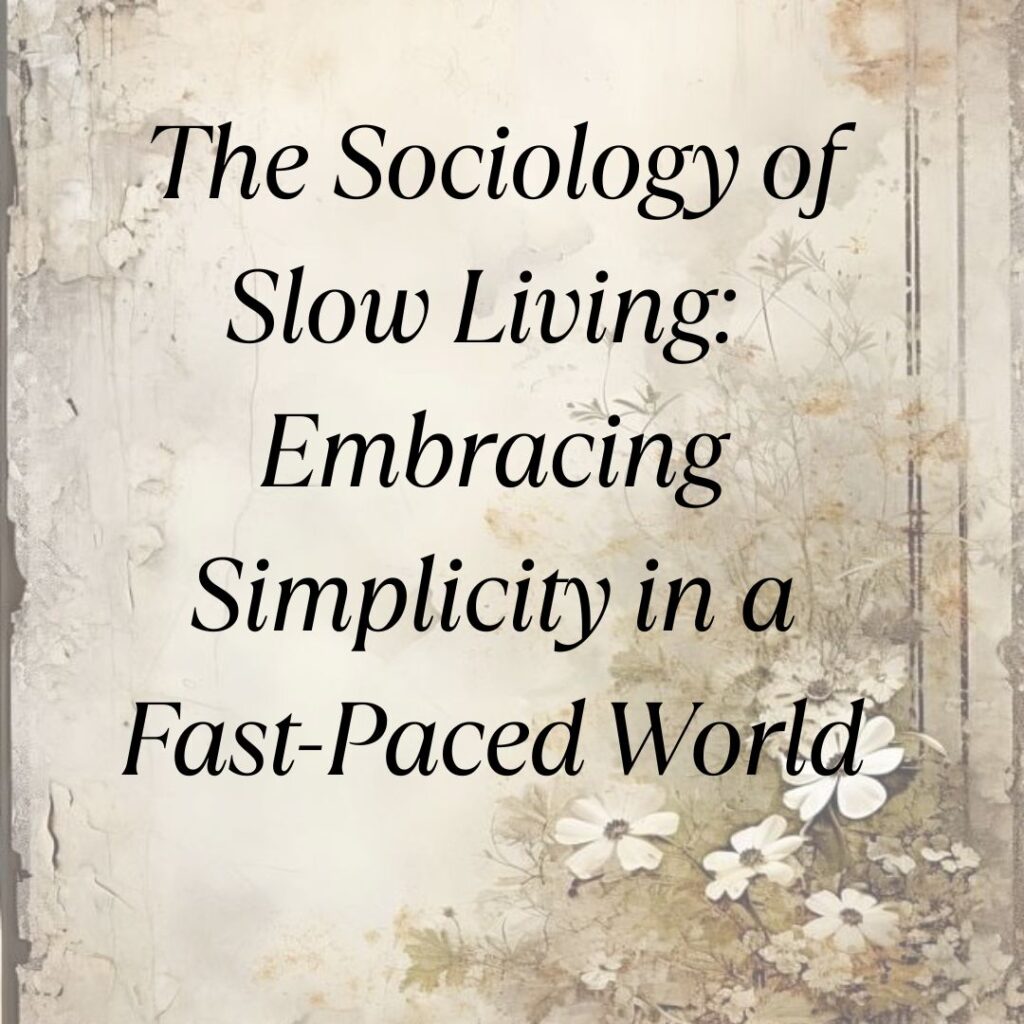In our modern, hyper-connected world, where speed and efficiency often take precedence, the concept of slow living has emerged as a compelling antidote. Rooted in the philosophy of embracing simplicity, mindfulness, and a more deliberate pace of life, slow living challenges the prevailing notion that faster is always better. This article delves deep into the sociology of slow living, exploring its principles, societal impact, and relevance in today’s context.
Understanding Slow Living
At its core, slow living advocates for a mindful approach to everyday life. It encourages individuals to savor moments, prioritize meaningful experiences over material possessions, and cultivate a deeper connection with oneself and the surrounding environment. This movement finds its roots in the slow food movement, which began in Italy in the late 1980s as a protest against the rise of fast food and the loss of traditional culinary practices.
Today, slow living extends beyond food to encompass all aspects of life—from work and leisure to relationships and consumption habits. It emphasizes quality over quantity, encouraging individuals to invest time and effort in activities that nurture well-being and foster sustainable lifestyles.
Societal Impact of Slow Living
The adoption of slow living principles can have profound societal implications. By encouraging individuals to consume less and live more intentionally, it promotes environmental sustainability. For instance, choosing locally sourced products and reducing waste aligns with slow living values of conservation and ecological responsibility.
Moreover, slow living challenges the culture of instant gratification and constant busyness prevalent in many societies. It prompts individuals to reassess their priorities, often leading to improved work-life balance, reduced stress levels, and enhanced overall happiness. In a study by the University of Groningen, researchers found that embracing slow living practices correlated with higher life satisfaction and a stronger sense of community among participants.
Relevance in Today’s Fast-Paced World
In an era dominated by technological advancements and digital connectivity, the allure of slow living lies in its ability to counterbalance the frantic pace of modern life. The COVID-19 pandemic, in particular, prompted many to reevaluate their lifestyles, with more people embracing remote work and seeking ways to simplify their daily routines. This shift underscored the importance of resilience and adaptability—key tenets of slow living—in navigating uncertain times.
Furthermore, slow living resonates with younger generations who prioritize authenticity, mindfulness, and social responsibility. Millennials and Gen Z, in particular, are driving demand for ethical consumption and sustainable practices across industries. Companies are responding by offering products and services that align with these values, reflecting a broader societal shift towards mindful living.
Practical Applications of Slow Living
Implementing slow living principles doesn’t necessarily mean abandoning technology or withdrawing from society. Instead, it involves making conscious choices that enhance personal well-being and promote a sense of fulfillment. Here are some practical ways individuals can embrace slow living:
- Mindful Consumption: Opt for products with minimal environmental impact and support local businesses.
- Digital Detox: Take regular breaks from screens to reconnect with nature or engage in offline activities.
- Cultivate Relationships: Invest time in nurturing meaningful connections with family, friends, and community members.
- Practice Gratitude: Foster a daily habit of gratitude to appreciate life’s simple pleasures and cultivate a positive mindset.
- Simplify Work: Prioritize tasks that align with long-term goals and delegate or eliminate non-essential responsibilities.
Conclusion
The sociology of slow living offers a compelling framework for navigating the complexities of modern society while promoting personal fulfillment and environmental stewardship. By encouraging individuals to embrace simplicity, mindfulness, and intentional living, slow living challenges us to reconsider what it means to lead a meaningful life in a fast-paced world.
As societal values continue to evolve, the principles of slow living provide a roadmap for creating a more sustainable and fulfilling future—one that prioritizes well-being, connection, and the preservation of our planet’s resources. Embracing slow living isn’t just a lifestyle choice; it’s a philosophy that invites us to pause, reflect, and savor the richness of our human experience amidst the whirlwind of modernity.






